The Daily Agenda: Lessons learned from the Don Bolles bill
There's always next year ... ERIC survives ... And seriously, David Stringer?
This year’s legislative session is, technically, ongoing, as lawmakers plan to return briefly starting June 12 to hammer out last-minute deals on a handful of important issues.
But there’s one huge issue we don’t expect lawmakers to finish when they return: The bill to build a monument to murdered journalist Don Bolles.
We’ve said that no bill is ever truly dead until the Legislature adjourns for the year. But in this case, we’re pretty sure it’s safe to declare our Bolles monument bill isn’t getting signed into law this year.
That’s a shame. And upon reflection, it’s at least partially our fault.
In case you missed it, we announced in January that the Arizona Agenda was launching its own legislative agenda. After a few years of casually mentioning the idea to lawmakers, lobbyists and other political geeks, Hank finally found two lawmakers — Democratic Rep. Jennifer Longdon and Republican Sen. T.J. Shope — who were willing to sponsor a bill to put a monument on the Arizona Capitol Mall’s Wesley Bolin Plaza to honor Bolles, who was killed by a car bomb in 1976 as retribution for investigating and reporting on corruption in Arizona government and business.
The bill passed the House Government Committee thanks in large part to some heartfelt testimony from Tim Eigo, an attorney and head of the local chapter of the Society of Professional Journalists. Even Republican Rep. Steve Montenegro, who nobody could accuse of being a lackey for the press corps, supported the idea.
In February, the bill cleared the full House, making it one of the few Democrat-sponsored bills to receive that honor.
But the Bolles monument hit a brick wall in the Senate. It was assigned to the Government Committee, which Republican Sen. Jake Hoffman chairs. Committee chairmen have immense power to kill legislation they don’t like, and Hoffman was no fan of our bill to honor Bolles.
We anticipated Hoffman would be a problem and had a few solutions in mind. But each of those solutions — like running a strike-everything amendment or getting the bill pulled from Hoffman’s committee — requires a willingness among other Republicans to sideline a chairman, and we couldn’t find anyone eager to take that risk.
“You know, I’ve always thought bills fail because of clashing personalities rather than the policy,” former lawmaker turned lobbyist Mark Cardenas, who we enlisted to help us lobby for the bill, told us yesterday when we asked why he thought the bill failed.
The clashing personalities being Hank and Hoffman and Arizona Senate President Warren Petersen.
It’s a fair analysis, and from the beginning, we knew that being the face of this project was a liability. We’ve taken our share of shots at Hoffman, a far-right MAGA warrior who was among Arizona’s slate of fake electors, not to mention Petersen. And we made it clear that we weren’t gonna stop doing that just to get the bill a hearing.
Admittedly, it was not a great lobbying strategy.
We also failed to anticipate just how little Arizona lawmakers would know about the Bolles saga, or even about what kind of monuments currently occupy Bolin Plaza. These are not, generally speaking, people who are well-informed about our state’s history. Many of them had never even heard his name.
But perhaps our biggest failing was not connecting sooner with the Bolles family. Long before we began, we asked our friend Jeremy Duda to reach out to Diane Bolles, a daughter of Don’s who occasionally speaks for the family, to ensure none of the family members would have a problem with the idea. Much later, we heard from David Bolles, one of Bolles’ sons, who wanted to help. He offered to coordinate a letter explaining what the monument would mean to the family. But by that time, it was already too late to draft something and get it approved by all the siblings in time to help dislodge the bill.
So what did we learn from this project? Well, we learned that lobbying is harder than it looks, and we’re not very good at it.
Still, we never expected to get the bill through the House. And that victory only cemented our determination to see a monument honoring Bolles take its rightful place alongside Arizona’s other honored heroes at Bolin Plaza.
But clearly, we’re not the best messenger. So we asked Eigo, whose moving testimony in the House Government Committee helped push the bill along, to take over the project through the Society of Professional Journalists. Eigo has some experience on this front, having gotten the Clarendon Hotel, where Bolles was bombed, declared a Historic Site in Journalism.
Eigo graciously agreed to spearhead the project next year, provided he can round up a crew of like-minded supporters at Investigative Reporters and Editors and other journalism orgs. Wish them luck, because in trying to honor a reporter at the Arizona Legislature, they’re gonna need it.
ERIC is safe in Arizona: Arizona Gov. Katie Hobbs vetoed a bill that would have pulled Arizona from a multi-state voter registration program designed to clean voter rolls, Greg Hahne reports for KJZZ. The system, known as ERIC, is widely used and trusted, but like so many trusted election systems, ERIC is now being sacrificed on the altar of election denial conspiracy theories.
Clean up your mess: Attorney General Kris Mayes is suing large chemical companies that manufactured PFAS. Mayes wants them to cover the cost of cleaning up these “forever chemicals” in soil and water, she announced yesterday. The chemicals are often used in firefighting foam, as well as nonstick cookware and other common items.
Will they count those dollars by hand?: Former Cochise County Elections Director Lisa Marra landed a $130,000 settlement with the county after she argued two of the supervisors created a “toxic” work environment by suing her personally and stoking conspiracy theorists who threatened her, the Herald-Review’s Shar Porier reports.
“No amount of money can compensate for what any election administrator has gone through since 2019. Sadly, most just walk away because taking legal action and hiring an attorney is very costly,” Marra told Porier.
Dealers need breaks too: Arizonans who were arrested for dealing small amounts of marijuana can have their cases expunged under Prop 203, which legalized recreational marijuana in Arizona, the Court of Appeals ruled. While the proposition clearly allowed expungements for possession, it was less clear whether that covered dealing less than 2.5 ounces as well, the Arizona Mirror’s Caitlin Sievers writes.
Whose bad idea was Prop 412?: Now that voters rejected the overly complicated Prop 412, Tucson City Councilman Steve Kozachik wants to figure out how to get the franchise agreement with Tucson Electric Power approved by voters, while coming up with a separate agreement to deal with undergrounding power lines and supporting the city’s climate goals.
Incentives are for suckers: Another failed ballot measure in Tempe left the Arizona Coyotes without a home. Now, a bunch of East Valley communities say they want the Coyotes, but they don’t want to offer incentives. Officials from various cities were cagey about their contact with the team when the Gilbert Sun asked.
Definitely a gray area: Santa Cruz County Supervisor Bruce Bracker might be headed into dangerous ethical waters as he hosts political groups at his restaurant in Nogales, Angela Gervasi reports for Nogales International.
Who knew public education was so profitable?: The owners of BASIS, a chain of public charter schools that cater to smart kids, bought the most expensive house in the Valley last month. Michael and Olga Block paid $6.75 million for their new 6,123-square-foot Paradise Valley home, Catherine Reagor reports in the Republic.
We’re never going to be able to buy a $6.75 million mansion if we keep giving out steep discounts like the one you’ll get if you click this button.
Higher falls hurt more: The Border Chronicle spoke with a doctor in San Diego about what he’s seeing as he treats migrants who fall from the border wall. The wall built during the Trump administration is much higher than the previous border fence and it’s leading to more serious injuries.
She’s so popular right now: Kari Lake could run for the U.S. Senate and be Donald Trump’s vice-presidential running mate at the same time, according to Arizona law. And because Arizona primary election ballots will likely go out before the vice president is named, it could be a giant mess if she tries to do both, Washington Post columnist Henry Olsen writes.
“Lake’s rapid rise gives her lots of choices. Given the opportunity to run for both Senate and vice president, Republicans and her fans should hope she chooses just one — for her benefit and theirs,” Olsen writes.
Whiskey is for drinking…: While ranchers are pretty stoked about the U.S. Supreme Court ruling that shrinks the number of bodies of water that are considered bodies of water for federal regulatory purposes under the Clean Water Act, environmentalists are not, Cronkite News’ Lillie Boudreaux reports. The case stemmed from an Idaho couple’s desire to build a home on wetlands they bought, but the ruling will have a significant impact on the waters of the West.
“If you love swimming in polluted creeks, this ruling is for you,” Taylor McKinnon, Southwest director for the Center for Biological Diversity, told Boudreaux.
College Republicans United, the bright young minds that brought you white supremacists with speaking gigs on ASU’s campus and the fight over who owns the organization, are hosting their second annual convention in Prescott next month.
Check out their list of speakers, which includes congressmen, criminals and the John Birch Society.




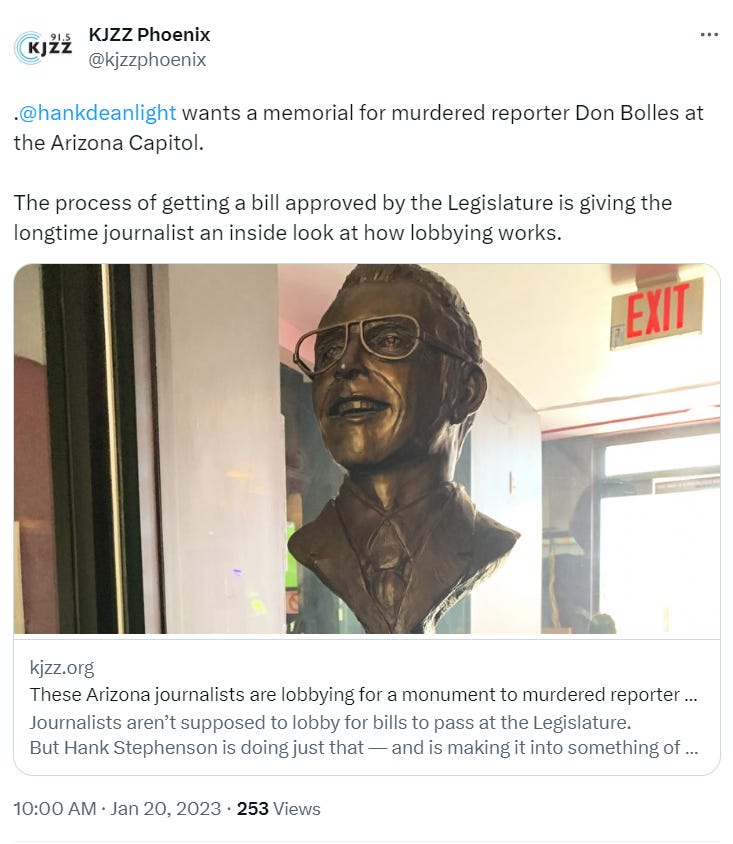
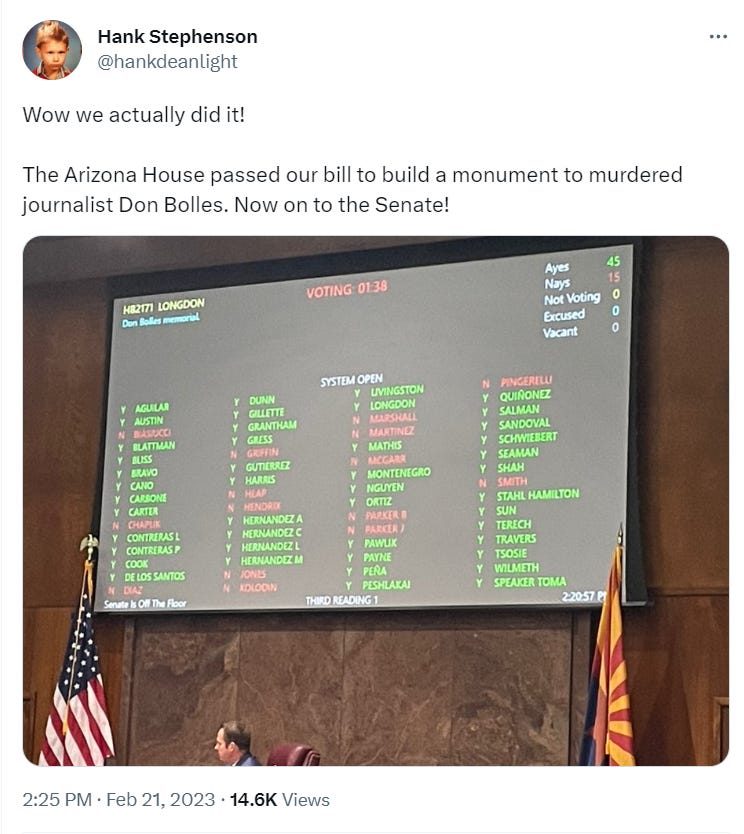
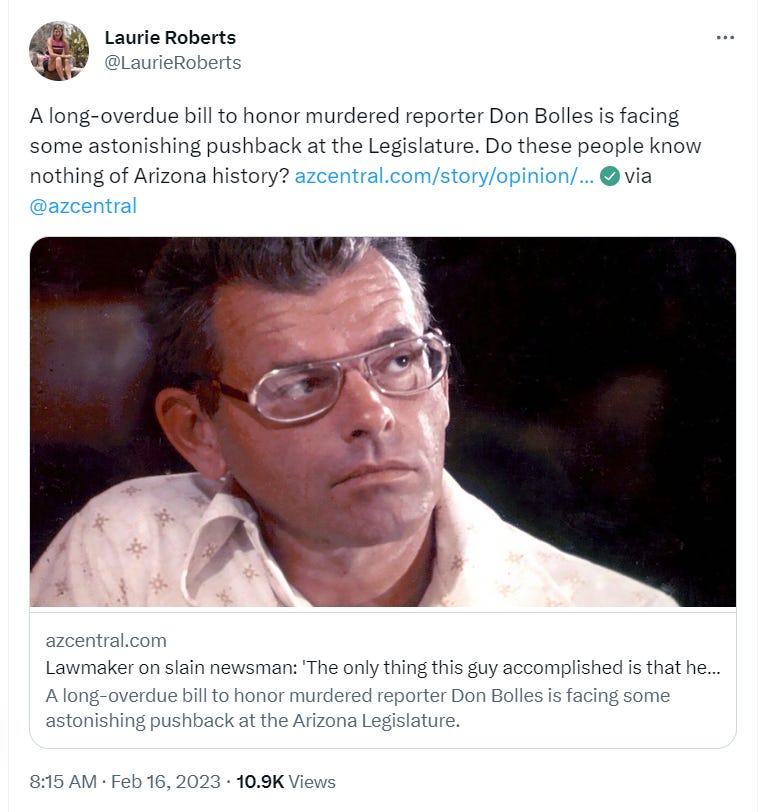

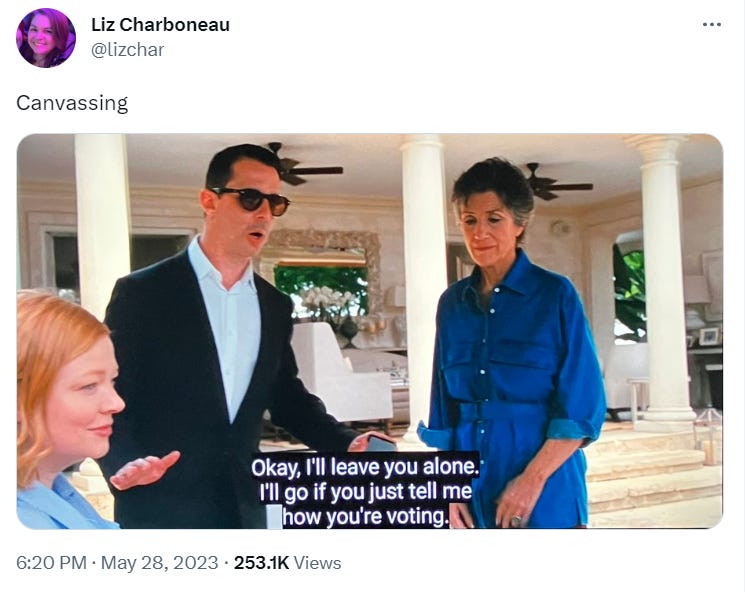


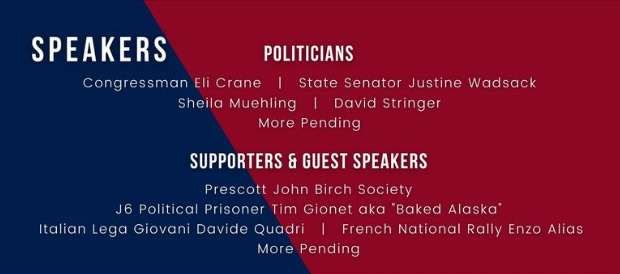
Thanks for the insight regarding the Bolles Bill. Your experience reinforces my belief that many of our legislators act according to what preserves their personal power, including making those they don’t like “pay” for their audacity to disagree. Personal politics nor public politics. Where are those politicians who actually care about “we the people”?
Charter schools are quasi-public -- and in Arizona, we allow for-profit outfits like BASIS. Teachers and other educators who directly help students should be well-paid. When you look at the type of wealth by a chain's owners that can buy a $6M house, you should ask, who's being paid well here?